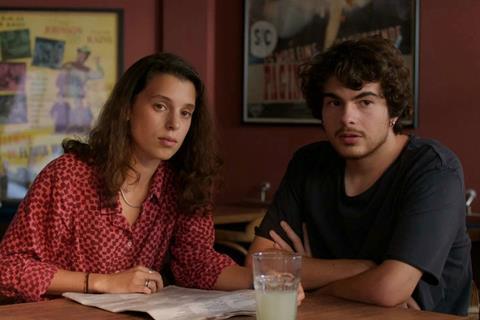The debut feature from Joao Rosas is a continuation of three previous short films

Dir/scr: Joao Rosas. Portugal. 2025. 99mins
It is spring in Lisbon and the city is full of light, warmth and promise. But Nicolau (Francisco Melo) is stuck, immune to its charms and unable to move forward. At just 24, his musical career has stalled, he is caught in a cycle of menial, low-paying jobs and he still lives with his parents. It has been a year since his girlfriend left and his broken heart shows no sign of mending. Then a series of chance encounters bump Nicolau out of his rut and he starts to live again, in this delightfully breezy, free-wheeling collage portrait of Gen Z on the cusp of adulthood.
Talky and satisfyingly wide-ranging in its themes
The debut fiction feature from Joao Rosas is a continuation of a series of interconnected stories that started in 2012 with the short film Entrecampos, in which the 11-year-old Nicolau (played by Melo) is the new friend of Mariana (played in the short and as an adult in this feature by Francisca Alarcao). Rosas revisited Nicolau’s world in two further shorts: Mario Do Mar (2015), which screened in competition at Locarno, and Catavento (2020). His unconnected feature-length documentary Death Of A City won the Doc Alliance award in 2023 for best feature.
The Luminous Life, which screens in Karlovy Vary’s main competition following a world premiere at IndieLisboa, is an auspicious move for Rosas, whose light touch brings levity to Nicolau’s angsty romantic travails. Talky and satisfyingly wide-ranging in its themes, the picture has something of the life-affirming spirit of the work of French director Guillaume Brac, in particular the sun-kissed spontaneity of All Hands On Deck. It is a charmer of a film that could catch the eye of curated streaming platforms or adventurous arthouse distributors.
“Of all things certain in life, there’s no surer thing than doubt.” It is a statement that chimes with disintegrating certainties in Nicolau’s fumbled existence. But the way it is delivered at the film’s opening, belted out with gusto by a multi-generational choir as the camera pans slowly around the faces of the singers, makes it sound joyful, almost exultant, rather than a cry of despair.
Finally, the camera rests on Nicolau, having taken in several characters who, to a lesser or greater extent, will change the course of his life in the coming months. It is Nicolau’s birthday, and he is too glum to celebrate. But new acquaintances from the choir, among them Tiago (Joao Fonseca) and his girlfriend, carefree French student Chloe (Cécile Matignon), persuade him to join a night out that takes in beer, pool and flirting, and ends with a broken push bike.
Nicolau may still be wallowing in sadness and what might have been, but this evening marks the moment his life starts moving forward again. The damaged bicycle leads to a new friendship with a handyman at the repair shop, which in turn leads to a job and a romantic treasure hunt in the programme of the cinemateca. Meanwhile, a subsequent job interview set up by his father results in a discovery about his parents that provides the impetus for Nicolau to finally move out. Then an unexpected meeting opens what promises to be a new chapter in his life.
This is a loose-limbed, meandering kind of storytelling that grows organically, like the branches of a tree – some of which are more fruitful than others. Woven through it all is music – Nicolau plays bass in a band that is never quite ready to debut in public; he sings snatches of songs with his friends – and the vibrant chorus of the city in the sunshine.
Production company: Midas Filmes
International sales: Loco Films sales@loco-films.com
Producer: Pedro Borges
Cinematography: Paulo Menezes
Production design: Claudia Lopes Costa
Editing: Luis Miguel Correia
Main cast: Francisco Melo, Cécile Matignon, Margarida Dias, Federica Balbi, Gemma Tria, Angela Ramos, Francisca Alarcao
















![[L-R]: Amanda Villavieja, Laia Casanovas, Yasmina Praderas](https://d1nslcd7m2225b.cloudfront.net/Pictures/274x183/6/4/1/1471641_pxl_20251224_103354743_618426_crop.jpg)




